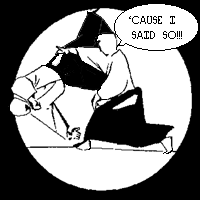
Granted, it doesn't happen often, but we're all human, it's just that students are a lot more human than their teachers. No one's perfect, and, if they were, there would be no reason for them to train in the martial arts because they would have already achieved the ultimate martial goal - total control over one's self and one's situation.
Now that we've estalished that the average instructor is (at least somewhat) human, the true question is at hand. Do you correct you teacher? There are a lot of factors at hand here, but, in my opinion, hell no. Unless you think the man or woman is doing something so wrong that you feel morally obligated to step in, the best thing to do is just 'go with the flow'.
Your sensei is your sensei for a reason: he's been exactly where you are and a lot more. His job is to train you and a number of other beginners to a point of saticfactory progress. An adverse force to this process is dissention among the students. It is agreed that all people make mistakes. A mistake by your sensei is just that - an error. This is absolutely no indication of a lack of knowledge on the sensei's part.
Indeed, when you began taking your course, part of what you did was give a vote of supreme confidence in your sensei. This is an intrigal part of the martial arts. Your instructor's rank isn't something that was just given to him because he attended a class for 'x' number of years and could perform 'y' number of techniques. He or she had the strength-of-character and spiritual poise to endure every bit of the process of learning that one goes through in attaining a high level in their respective art. When the student surpasses the teacher, he or she may then then correct the teacher. The irony is, once a student has done so, he or she will have realized that their teacher never once 'needed' correction at all.
Does it really matter if my instructor travels the country's demonstrations and seminars tour? Does it matter if he's Japanese? Does it even matter if he's trained in Japan? The answer depends, obviously, on whom you ask. And, this being my opinions column, I say not at all.
What matters is whether or not you and your instuctor have a relationship of mutual respect, and you're making reasonable progress in learning what you set out to learn. If you are experiencing this kind of training environment, then good for you. If that's not happening, and you did ample research when selecting your dojo, then you can't do anything but deal with it, or leave. Your teacher's noteriety, however, basically has no reason to affect this aspect of your training. Or any real aspect, for that matter.
If an Aikido student just wants to be able to say that he or she trains under the great 'So and So', then, first, I sincerly hope this person hasn't been self-convinced that a famous instructor nesseccarily makes a good one, and, second, that person probably won't get a whole lot out of his or her training besides kata's and breakfalls. No one that is in this for bragging rights will be able to truly experience the internal, spiritual side of Aikido without a serious change in attitude.
I'll certainly grant that a well-known instructor is probably a good choice. They certainly know what they're trying to teach you, and thier credentials should speak for themselves. The problem is, on an individual level, it's very, very easy to simply be incompatable with someone. It may not even be a problem with personality conflicts, it may just be that the student simply doesn't get what the instructor is trying to say. Either way, the amount of people that know your sensei on an instructional level is irrelevant when it comes to you and your training. Besides, name-recognition gives no monopoly on skill, wisdom, or dignity.
Now, is my instructor well known? No. Is my instructor a good teacher and guide? Of course. Is my opinion biased? Sure, whose isn't? And they're all entitled to it!
